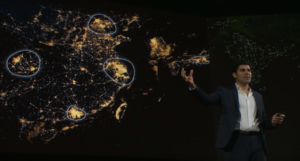 The Opening: Parag Khanna begins his inspiring talk by comparing the amount of infrastructure that we currently have that increases connectivity (i.e. telecommunications cables, roads, power grids) to the total length of country borders. He is trying to show that while there are a lot of borders, there is more connectivity. This is an interesting comparison that is likely to attract the viewer.
The Opening: Parag Khanna begins his inspiring talk by comparing the amount of infrastructure that we currently have that increases connectivity (i.e. telecommunications cables, roads, power grids) to the total length of country borders. He is trying to show that while there are a lot of borders, there is more connectivity. This is an interesting comparison that is likely to attract the viewer.
Main Points: Khanna then goes on to explain why connectivity is important. Over the past decades, collectively, we have been spending more on building infrastructure as opposed to building millitaries. As a result, the world populations have become more interconnected, which has not only boosted the economy but has also ensured more peace. The more invested that countries are in each other, the less likely they are to disturb the system. Khanna continues by reminding the audience that World War III was expected to break out in Asia. However, due to the increased investment that countries are allocating to each other, the tensions between the countries are moving to the back burner. Khanna argues that political tensions are less important than economic prosperity. This economic prosperity has led to intense urbanization that Khanna predicts will continue into the future. According to the UN, two-thirds of the world’s population will live in cities. They will invest in programs that are beneficial for the environment, such as net zero emission buildings and car sharing, and will thus start to solve some of the problems they cities created during the industrialization period. Khanna emphasizes the importance of infrastructure and connectivity by pointing out that the UN has included infrastructure as one of its top objectives.
Connectivity, not sovereignty has become the organizing principle of the human species.
The Closing: Parag Khanna suggests a future world where political systems are no longer important. What is important then is that everyone is connected. He predicts that there will be more stability in the future because there will be more connectivity. Asian countries are investing billions of dollars into each other despite their history of political tension and military aggression. Khanna hopes that we will redefine our future to depend on connectivity instead of on political agendas and tensions.
My Opinion: While this talk was very inspiring, it came at a time just before the world began to elect protectionist leaders. Parag Khanna makes a joke saying that “North America does not need more walls, it needs more connections.” Unfortunately, the people have elected the need for more walls. The same goes for the UK, who chose to put up a wall between it and the European Union. While Khanna provides evidence for why tensions may have been reduced as a result of connectivity, it seems like the human race cannot get over their prejudice and invest in each other. I think that it would be really neat to see a world where everyone is pushing each other to succeed. And yet, I don’t know if that future will be attained by 2030 as Parag Khanna is hoping.